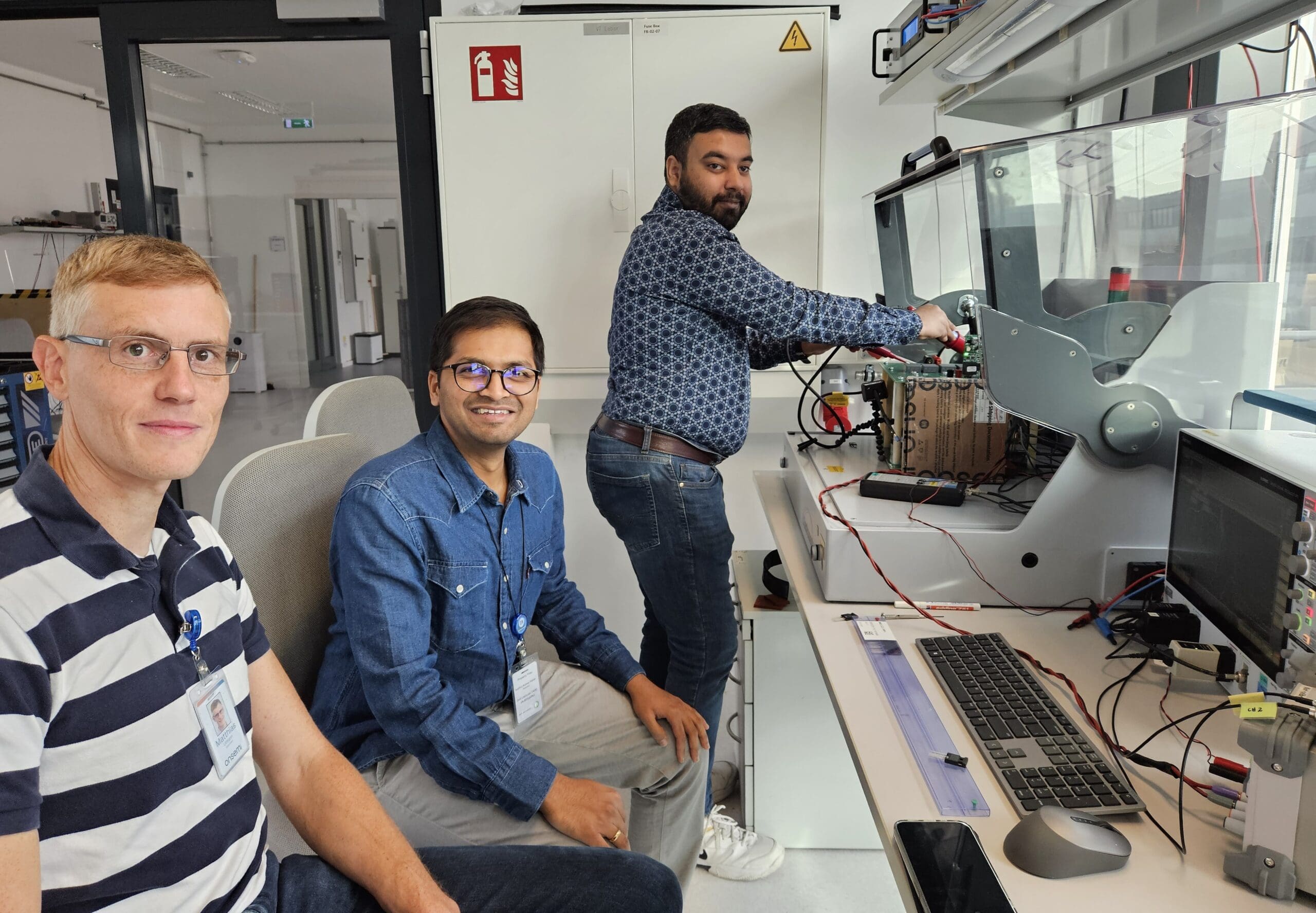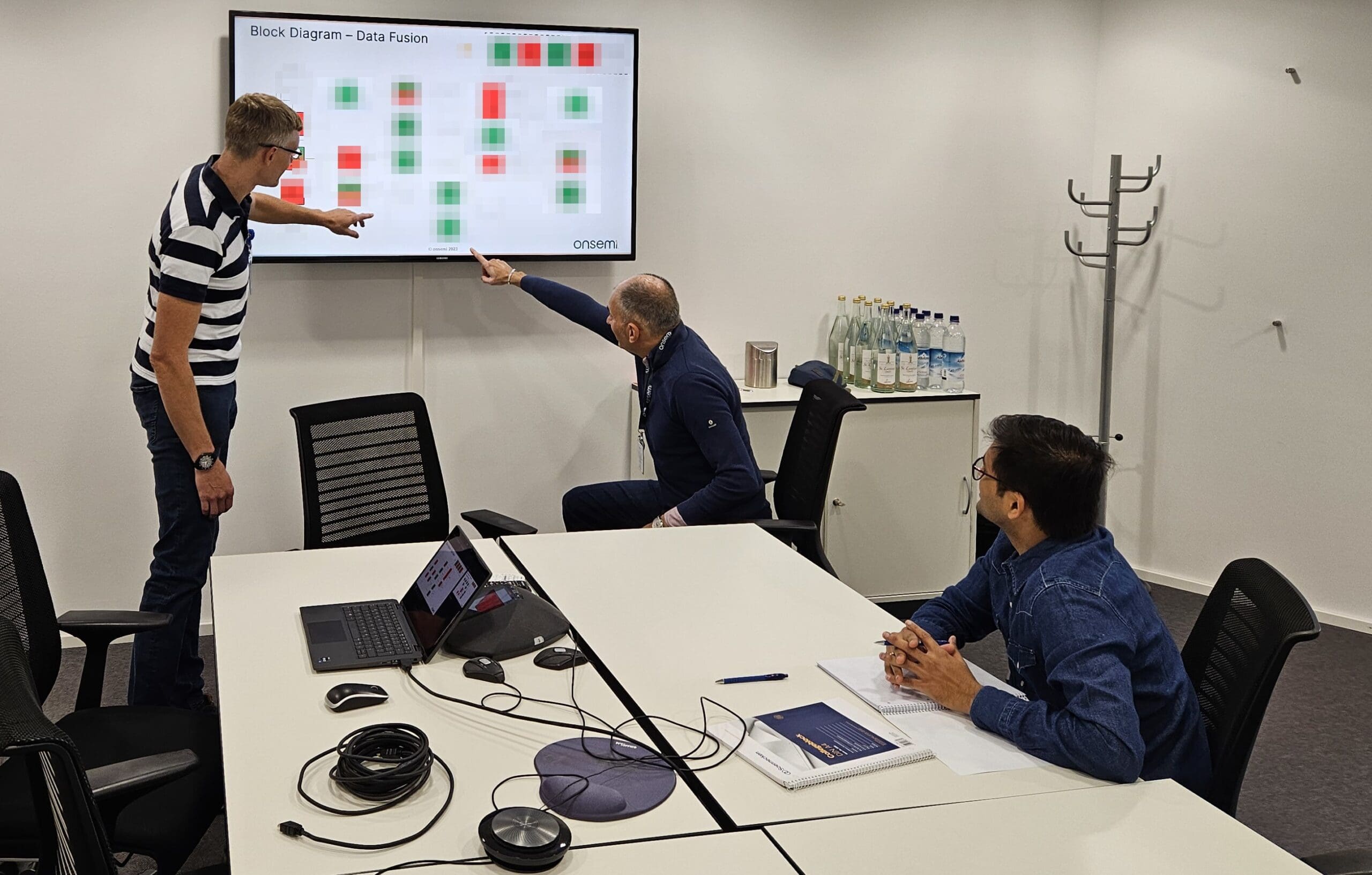Life of an Automotive Field Applications Engineer Manager
Matthias Ulmann studied engineering and has worked as an engineer for REFU Elektronik GmbH, Texas Instruments and onsemi. He has specialised in power management and automotive. Matthias is now Automotive Field Applications Engineer Manager – Advanced Driver Assistance Systems (ADAS) Power and is based in Baden-Württemberg. In this article he shares his career experience and path to becoming a Field Applications Engineer Manager.


Background
Why did you decide to study engineering? Was there a family member who encouraged you?
My father was an electronic engineer with a passion for DIY, not only related to electronics. As a result, I came into contact with the topic early on.
Were there any childhood interests which were a factor?
Definitely. I spent a lot of time in my father’s well equipped workshop building lot of different things and later on I got into shortwave listening and CB radio, too.
Has there been a particular person who inspired you in your early career?
Yes, my manager during my time as a power reference design engineer. Basically, he brought me into the semiconductor industry, taught, challenged, and promoted me. Not only did I gain solid expertise in the power area, but I also developed a new mindset.
Typical week as a Field Applications Manager
What exactly does your role include and what’s your typical week like?
Besides managing a team of three FAEs and one new college graduate, who is currently assigned to our training programme before being deployed as a junior FAE; I also cover one CAT 1 customer and one OEM.
Projects, training, and development
From a management perspective, fixed points on the agenda are regular 1:1 meetings with each team member, with my complete team as well as with my manager. There we discuss the progress on projects, provide and receive feedback related to our activities with customers and internal topics. Also training and development of everyone is an important topic from a management perspective at onsemi to make sure that everyone can develop their career.
Occasional technical meetings are in place with the different business units to drive our product roadmap and discuss trends we see at our customers.
Support
Support of the assigned customers takes about 50 % of my time. On average I have customer meetings, either face-to-face or via Teams, approximately once per week. Overall, these activities include identification of new projects at our customers and providing solutions based on our portfolio, as well as providing feedback on technical questions and inquiries. For some activities support from our application engineers or marketing is needed, others are covered by me only.
Which industries do you work with?
Semiconductor industry
Travel and work life balance
How much travel do you do now that you are a manager, and how do you maintain a work life balance?
The majority of my travel is still related to my work as a FAE. I live around 2 hours’ drive away from our office and work from home. However, I visit the office every one or two weeks. Even though we have very close collaboration via all the modern tools of communication, I still think personal contact is important, especially for new hires.
Work-life balance is working well most of the time, but in this kind of role where you are working directly with customers there are always periods with higher and lower activities. Time management and setting priorities is therefore an important skill.
From a management perspective the individual support and mentoring of a team member decreases once the FAE gains experience and starts to work more and more independently.
Support
Which other people/departments give you support/do you work with? (e.g., sales, applications, quality)
Each customer is covered by a team of, a salesperson and a FAE. For large accounts there can be several salespeople and FAEs as well, covering different applications, departments, or locations. Sales and Field Applications Engineering work closely together. The salesperson covers commercial topics and the FAE technical topics, but there will also be some overlap.
Application Engineers
The application engineers within the various business units are the main contact for technical questions, which cannot be directly answered by the FAE.
Marketing
Marketing is the main contact for product updates and new product discussion as well as customer feedback.
Quality
Quality is important for the component release process at a customer and issues related to products.
The impact of EVs
How big an issue is car safety and what needs to be resolved still?
Personally, I think that modern cars are very safe and with each new generation additional functionality is added to increase safety further. A main driver for this is legislation, for example, a driver monitoring system became mandatory for all new cars.
Could field engineers one day be driven by their car to appointments and do other work on the way?
I hope this becomes true while I’m still working. Three to four years ago the market was very enthusiastic about fully autonomous vehicles (level 5). However, it turned out, that it was way too complex, not only from an electrical point of view but also software wise. Today, the majority of activities are related to level 2 to level 3 for the next generation of vehicles. That means the car can drive autonomously under certain conditions, for example on the highway up to a certain speed. But to makes this possible on any kind of road is still a huge challenge, I think.
The future of electric vehicles
What are your predictions for the future of electric vehicles?
The switch to electrical vehicles is probably a revolution.
However, further development is more of an evolution with smaller steps regarding efficiency, range, and features. The difference between two generations of cars won’t be large like we have seen in the past in the automotive market. However, you will see a huge difference comparing an EV in 10 years with an EV of today.
The only part where I could imagine a revolution is related to batteries. A new battery chemistry – cheap, safe with high power density – could become a game changer and would also have huge impact on storage solutions for households and industry.
As an electrical engineer I am convinced of the viability of EVs from a technical point of view. But to make the most out of it, renewable energies should be used for charging the battery.
Most challenging part of the job as a Field Applications Manager
What do you find most challenging when you are working?
To stay focused due to the various distractions and interruptions made by the modern world. Emails, messengers, phone calls and meetings can make it challenging sometimes.
What do you do when a problem seems unsolvable? (What is your method for tackling it?)
First of all, don’t panic.
Ask people you trust for advice. It can also be a great idea to ask a person who has no knowledge about the topic itself – sometimes you are too close to the problem to see the solution.
Plus, it’s always a good idea to sleep on it for a night. You probably won’t sleep well, but you might find a solution.
Where do the main challenges come from – customers, managing people or technical issues?
From all three areas.
It is not possible to sort them by difficulty, as they usually need quite different skills and solutions to solve them.
Technical issues are related to physics and facts.
Customer and managing issues are on a relationship level and might even have political aspects.
Generally, I prefer the technical issues.
FAE to Field Applications Manager
In your opinion what are the additional skills and qualities needed by an FAE to become a manager?
Empathy, trustworthiness (that you must first earn) and flexibility are the first things which come to my mind. Leading by example goes without saying.
What advice would you give to any FAE who is aiming to be a Manager one day? (how can they start to prepare?)
Communicate your career goals clearly with your manager. Only if your manager knows about them, can your goals be supported.
Offer yourself as mentor for a new hire. This will give you an idea of a few aspects of the work of a manager.
In our business the information flow about the needs and trends of our customers to the business units to make sure the right products are developed is crucial. Collecting information from different FAEs, leading discussions and meetings, preparing and presenting summaries is a great way to develop important skills needed as a manager.
Plus, in general, be pro-active and make yourself visible in a positive way. People will recognise your enthusiasm and commitment.


New engineers
What makes a good FAE or Technical Marketing Engineer?
There are four key skills as follows.
Well-founded technical knowledge about the product and its applications.
Curiosity and dedication for continuous learning.
Good communication skills, flexibility, and the willingness to leave one’s comfort zone.
The capability to be calm and listen to the customer.
Why would you recommend moving into a customer facing role from a pure development role?
First of all, both positions are very important, there is not one which is better or worse. For example, when I started my career as a hardware designer, I could not even imagine working directly with a customer. I was interested only in hardware.
But over the years you grow, interests change, you gain more knowledge and self-confidence, maybe you already had some initial contact with customers and liked it.
That means even for a strictly technical person it can be a good idea to consider a customer facing role when looking for new challenges and the desire for more interaction and direct communication about products and their definition.
Generally, when working with customers your work will gain a big portion of human interaction which brings a lot of fun, but sometimes also challenges. However, building relationship, promoting products, and achieving design-ins can be as fun and give as great a feeling of success as bringing an electronic design into proper operation. And sometimes even more!
Communication skills
How important are communication skills?
For a FAE probably the most important skill. This is because, this position is between the customer and the company.
For the customer, you are the face of the company.
For the company, you are the customer’s representative.
It is key to be able to understand, discuss, prioritise, summarise, and present highly complex topics and lead such kind of discussions. Transparent and clear communication is key for success as well as appropriate and professional behaviour towards the customer in any situation.
Conclusion to Life of an Automotive Field Applications Engineer Manager
I never planned my career and never had a goal like:
“I want to be in position xyz when I am 40 years old”.
In every position I gave my best and once I saw that no further career progression was possible, sometimes by chance, I got another opportunity by talking to people. At the end there was also a big portion of luck that I was able to move into my current position and responsibilities.
In retrospect I would recommend everyone to think more about their career and long-term plans than I did, usually you cannot rely on luck only. Involve your manager and HR in these discussions and considerations from the beginning onwards. A good manager will be very happy about supporting the career of each team member and see them growing in their current and future roles.
Further reading
What makes a great Field Applications Engineer?
John DeFiore – a Field Applications Engineer for Texas Instruments in California
Working as an Embedded Systems FAE in the automotive sector


Responses